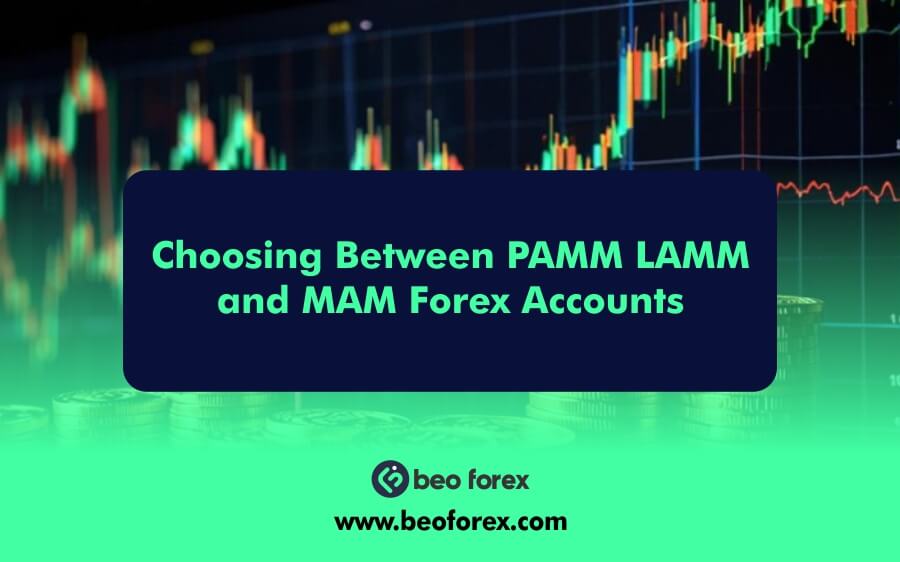Choosing between PAMM, LAMM, and MAM forex accounts has to do with selecting an option that best suits your investment needs. In the realm of forex trading, investors frequently look for managed accounts in order to benefit from the experience of seasoned traders while lowering the risks involved in trading in extremely unpredictable markets. The most popular choices among the available options are choosing between PAMM, LAMM, and MAM forex accounts, i.e Percentage Allocation Management Module, Lot Allocation Management Module, and Multi-Account Manager . Every one of these account kinds has special qualities, advantages, and restrictions. The differences between PAMM, LAMM, and MAM forex accounts will be discussed in this article to assist you in choosing the option that best meets your investing requirements.
An Overview of Managed Forex Accounts
It’s critical to understand managed forex accounts before delving into the nuances of or differences between PAMM, LAMM, and MAM forex accounts. These accounts allow investors to entrust their trading funds to experienced managers who make trading choices on their behalf. The primary benefits consist of:
- Expertise: Experienced traders possess the know-how to successfully negotiate the intricacies of the forex market.
- Time-saving: Managed accounts spare investors from having to keep a close eye on the markets.
- Diversification: A variety of trading techniques and currency pairings might be advantageous to investors.
These advantages do come with dangers, though, so investors need to be sure to pick the kind of account that meets their risk tolerance and investing objectives.
How Do PAMM Accounts Work
Investors can allocate their cash to a trader’s account through PAMM accounts, and the trader will split gains and losses according to the percentage of capital each investor provides.
How it operates:
- Allocation: Money is deposited by investors into a trader-managed PAMM account. Trades are executed by the trader, and the outcomes are based on each investor’s stake in the account.
- Performance Fees: Usually assessed as a proportion of profits, managers charge performance fees. The manager is encouraged to maximize returns as a result.
Benefits of Using PAMM Accounts
- Transparency: The ability for investors to see their accounts’ performance in real time promotes investor and manager trust.
- Proportional profit sharing makes sure that each investor has a part in the account’s performance by allocating profits and losses based on their share.
- Low initial Investment: A large number of PAMM accounts are available to a wider audience due to their comparatively low initial investment requirements.
PAMM Account Drawbacks
- Restricted Control: Investors have no say in the trading decisions made by the manager.
- Risk of Manager Performance: The success of a PAMM account mostly depends on the manager’s expertise and market conditions.
How Do LAMM Accounts Work
Investing on lots instead of percentages is possible with LAMM accounts, or Lot Allocation Management Module accounts. This implies that trades are carried out in accordance with these lot allocations, with each investor’s contribution being considered as a unique lot size.
- Lot-Based Allocation: This gives investors more flexibility in risk management by allowing them to have varying lot sizes according to their capital contributions.
- Individual Trade Management: Depending on the lot size of the investor, individual trades can be completed using LAMM accounts, which may result in varying profit and loss outcomes for each investor.
Benefits of LAMM Accounts
- Customizable Lot Sizes: By allowing investors to select their lot sizes, they may better customize their risk exposure to suit their own tastes.
- Direct Control Over Investment: Since they can choose their own lot sizes, investors can differentiate their risk exposure from that of other investors, giving them some degree of direct control over their investments.
LAMM Account Drawbacks
The complexity of LAMM accounts has some drawbacks.
- When it comes to understanding the lot-based allocation, some investors may find it more difficult than with the percentage-based concept of PAMM accounts.
- Possibility of Unequal Profit Distribution: Even while using the same trading technique, investors may have different results because earnings and losses are determined by the size of each individual lot.
How Do MAM Accounts Work
A manager can oversee several trading accounts at once and execute trades on all of the accounts at once with MAM accounts, also known as Multi-Account Manager accounts. Different allocation techniques, such as lot-based and percentage-based allocation, are possible with this configuration.
- Simultaneous Trading: MAM accounts guarantee consistency in the execution of strategies by enabling trades to be completed simultaneously across several accounts.
- Allocation Flexibility: Funds can be allocated by managers using a variety of techniques, which enables them to customize their strategy to meet the requirements of each investor.
Benefits of MAM Account
- Diverse Allocation Techniques: MAM accounts provide investors with flexibility in the allocation of their investments, enabling a tailored strategy based on their own preferences.
- Effective Trade Execution: Managers are able to swiftly execute trades on behalf of several clients, guaranteeing that investors share in the same market circumstances.
Drawbacks Associated With MAM Accounts
- Greater Minimum Investment Requirements: Compared to PAMM accounts, MAM accounts frequently have higher minimum investment requirements, which may restrict accessibility for certain investors.
- Complex charge Structures: Investors may need to comprehend the various fees associated with performance and management in MAM accounts, which can have more complicated charge structures.
Key Differences Between PAMM, LAMM, and MAM Accounts
1. ALLOCATION METHOD:
- PAMM: Percentage Based
- LAMM: Lot Based
- MAM: Flexible (Percentage or Lot)
2. CONTROL LEVEL
- PAMM: No Control
- LAMM: Some Control Over Lot Size
- MAM: Varies By Investor
3. MINIMUM INVESTMENT
- PAMM: Usually Low
- LAMM: Moderate
- MAM: Generally High
4. TRANSPARENCY
- PAMM: High
- LAMM: Moderate
- MAM: High
5. COMPLEXITY
- PAMM: Low
- LAMM: Moderate
- MAM: High
6. PERFORMANCE FEES
- PAMM: Common
- LAMM: Varies
- MAM: Can Be Complex
Selecting the Appropriate Account Type
The following elements should be taken into account while choosing between PAMM, LAMM, and MAM accounts:
1. Investment Objectives
Your investment objectives will strongly impact your choice when choosing between PAMM, LAMM, and MAM forex accounts. A PAMM account can be the best option if you’re searching for a simple, transparent method with little control. A LAMM account might be better appropriate if you want more control over how much risk you take. MAM accounts can be the ideal option for anyone looking for multiple account management and flexibility in allocation methods.
2. Tolerance for Risk
It’s important to evaluate your risk tolerance. While LAMM accounts provide a more customized risk approach through lot sizes, PAMM accounts distribute risk based on capital contribution. MAM accounts can offer flexibility as well as the chance to spread risk among several different approaches.
3. Experience with Investments
Your decision may be influenced by your level of forex trading experience. Because PAMM accounts are simple, they could be less intimidating to beginners. Investors with more experience might value the intricacy and control that MAM and LAMM accounts provide.
4. Minimum Amount Needed for Investment
Think about the money you have available. The minimum investment limits for PAMM accounts are frequently lower, which is ideal if you want to start with a smaller sum. MAM accounts, on the other hand, might need a larger initial outlay.
5. The Manager’s Track Record and Reputation
The manager’s abilities and background play a major role in the success of your investment, regardless of the type of account. Check the manager’s performance history, tactics used, and track record to be sure you’re giving your money to a qualified expert.
6. Charge Schedules
It’s critical to understand the charge schedules connected to each kind of account. Make sure the costs are in line with your investment objectives and that the methodology used to determine performance fees meets your comfort level.
Summary
Your investing objectives, risk tolerance, and personal preferences must all be carefully taken into account when choosing between PAMM, LAMM, and MAM forex accounts. To accommodate various investment types, each account type has specific benefits and drawbacks. Making an informed decision can be achieved by understanding the underlying distinctions and integrating them with your investment plan.
In the end, how well your selected account performs will mostly depend on how knowledgeable the manager is and how involved you are with the investing process. To improve your forex market investing experience, do extensive study, pose inquiries, and keep up to date. Managed forex accounts, when used properly, can offer a great chance for advancement in a demanding and exciting trading environment.
Frequently Asked Questions
1. What are the processes associated with Choosing between PAMM, LAMM, and MAM forex accounts?
- Think about your preferred level of control, minimum investment criteria, risk tolerance, and investing goals. Consider your demands when making your decision and keep in mind that each type of account has unique benefits.
2. How do these various account kinds differ from one another?
- MAM accounts provide variable allocation techniques, while LAMM accounts are lot-based and PAMM accounts are percentage-based. While MAM accounts could need a larger initial capital requirement, PAMM accounts usually have smaller minimum investments.
3. What costs are connected to these accounts?
- Fees differ based on the manager and kind of account, but they frequently include performance and management fees. Before making an investment, it’s critical to understand the charge schedule for each account.
4. Are these accounts appropriate for beginners?
- Because PAMM accounts are transparent and easy to use, they might be a better option for beginners. Accounts for LAMM and MAM can need more knowledge and expertise.
5. How are these accounts’ performance metrics determined?
- Tracking the returns produced while taking into account the total amount invested and account performance is how performance is usually determined. The account manager usually provides reports.
6. How much authority do I have over my financial commitment?
- You have no control over specific transactions in PAMM accounts. While MAM accounts can differ depending on the selected allocation technique, LAMM accounts give some control through lot sizes.
























